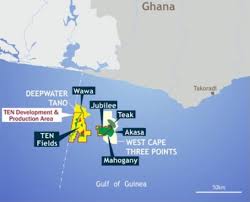Special topics
 Norwegian billionaire Kjell Inge Roekke’s Aker Energy plans “significant” oil exploration and production in Ghana after a $100 million deal to buy Hess Corporation’s (HES.N) business there.
Norwegian billionaire Kjell Inge Roekke’s Aker Energy plans “significant” oil exploration and production in Ghana after a $100 million deal to buy Hess Corporation’s (HES.N) business there.
Aker Energy said the proposed transaction, which is subject to approval from Ghanaian authorities, gives it a 50-percent stake in the ultra deepwater Tano Cape Three Points block which holds an estimated 550 million barrels of oil equivalent and has the potential for a further 400 million barrels.
Aker (AKER.OL), Roekke’s main listed investment vehicle, owns 50 percent of Aker Energy, while TRG, his privately held holding company, owns the remainder.
Aker Energy plans to present a development plan for the block this year, with production from the West African country expected to start in 2021.
“Ghana is still in the early days of developing its oil and gas resources, so for us, it means we can quickly build up there at a very exciting price,” Aker CEO Oeyvind Eriksen told Reuters on the sidelines of an earnings presentation.
Eriksen likened the Ghanaian field to the Johan Castberg field in the Norwegian Arctic as both have a break even price lower than $35 per barrel. Brent crude LCOc1 was trading at around $65 on Monday.
Roekke’s TRG is also involved in a separate block in the area, which may provide additional resources to the development, Aker said, adding that the plan is to use a floating production, storage and offloading vessel.
Ghana is seeking to develop its oil and gas resources beyond its flagship Jubilee field. Overall it was expected to produce an average of 200,000 barrels of oil per day in 2017, the country’s deputy oil minister told Reuters in June.
The deal is the second between an Aker group company and Hess, following Aker BP’s (AKERBP.OL) purchase of the Norwegian assets of Hess in a $2 billion transaction.
When the field development plan in Ghana has been approved, Aker expects to draft financial or industrial partners into the project to help pay for it.
Shares in Aker were up 1.6 percent at 1053 GMT, outperforming a 0.2 percent rise in the Oslo benchmark index.